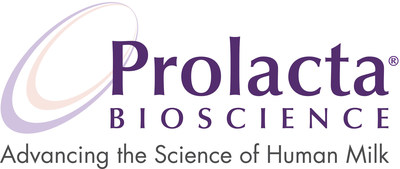Prolacta Bioscience Launches New Resources For Nurses, Clinicians Working With Premature Infants
DUARTE, Calif., Aug. 18, 2017 /PRNewswire/ -- Prolacta Bioscience, the nation's leading provider of human milk-based neonatal nutritional products to hospitals, has released several new resources for nurses and clinicians working with premature infants in the neonatal intensive care unit (NICU).

Educational and support resources include:
- Special Edition of Latch E-newsletter
- The e-newsletter is published by Prolacta's Nursing Practice Advisory Council (NPAC), an advisory group of neonatal nursing leaders who are passionate about human milk science and nutrition.
- The new edition of Latch is timed to coincide with Breastfeeding Awareness Month and focuses on mother's milk production, maintenance, staff support and advocacy for breastfeeding in the NICU.
- Nurses and clinicians can sign up for the free newsletter at http://blog.prolacta.com/.
- Webinar on an Exclusive Human Milk Diet and Optimizing Nutrition
- Prolacta has also released a new webinar, "Managing an Exclusive Human Milk Diet (EHMD)1 in Very Low Birth Weight Infants: Optimizing Enteral Nutrition."
- Led by Dr. Melinda Elliott, Senior Director of Clinical Education and Professional Development at Prolacta, the webinar focuses on:
- Short- and long-term benefits of an EHMD for premature infants;
- The use of Prolacta's human milk-based fortifiers to ensure optimal protein, minerals and vitamins premature infants need;
- Strategies to optimize nutrition to improve growth outcomes for very low birth weight infants.
- Nurses and clinicians can register for the free webinar at http://prolacta-1.hs-sites.com/webinar/optimize-nutrition-for-growth-enduring.
- Webinar on Multi-Study Review of the Use of Human Milk-Derived Cream and Outcomes
- Prolacta's Nutrition Advisory Committee (NAC) held a webinar on Wednesday, Aug. 16, on the "Multi-Study Review of The Use of Human Milk-Derived Cream in Very Low Birth Weight Infants and Outcomes."
- The webinar focused on two articles on the use of Prolacta's human milk-derived cream to improve overall caloric intake without substantially altering the volume infants are fed.
- Webinar on Transitioning a NICU to an EHMD
- A third webinar will be available on Wednesday, Sept. 20.
- The webinar, titled: "Successfully Implementing an Exclusive Human Milk Diet in the NICU: A Nurse Director's Insights and Lessons Learned," will explain how hospitals can ease the transition to an EHMD into their NICUs.
- Registration is free and available online at http://prolacta-1.hs-sites.com/webinar/onboard-in-5-weeks.
When used as part of an EHMD, Prolacta's neonatal nutritional products are clinically proven to improve health outcomes2,3,4 and reduce hospital costs5,6 for critically ill, extremely premature infants weighing between 500-1,250g (1 lb 1 oz to 2 lbs 12 oz) at birth, in the NICU, as compared to cow milk-based fortifier or cow milk-based preterm formula.
About Prolacta Bioscience
Prolacta Bioscience, Inc. is a privately-held life sciences company dedicated to Advancing the Science of Human Milk®. The company pioneered the development of human milk-based neonatal nutritional products to meet the needs of critically ill, premature infants in the NICU. Prolacta leads the industry in the quality and safety of nutritional products made from donor breast milk and operates the first and only pharmaceutical-grade manufacturing facility for the processing of human breast milk.
1 An EHMD is when 100% of the protein, fat and carbohydrates in an infant's intake are derived solely from human milk.
2 Sullivan S, et al. An Exclusively Human Milk-Based Diet is Associated with a Lower Rate of Necrotizing Enterocolitis than a Diet of Human Milk and Bovine Milk-Based Products.The Journal of Pediatrics. April 2010. 156(4):562-567. doi: 10.1016/j.jpeds.2009.10.040. The randomized study of 207 infants weighing 500-1,250g compared the benefits of an exclusive human milk diet with a diet of both human milk-based and cow milk-based products.
3 Cristofalo EA, et al. Randomized Trial of Exclusive Human Milk versus Preterm Formula Diets in Extremely Premature Infants.The Journal of Pediatrics. December 2013. 163(6):1592-1595.doi: 10.1016/j.jpeds.2013.07.011. The multicenter randomized controlled study examined 53 extremely premature infants weighing 500-1250g who were fed either a bovine milk-based preterm formula or an exclusive human milk diet, comparing the duration of parenteral nutrition, growth and morbidity.
4 Abrams SA, et al. Greater Mortality and Morbidity in Extremely Preterm Infants Fed a Diet Containing Cow Milk Protein Products.Breastfeeding Medicine. June 2014. 9(6): 281-0285. doi:10.1089/bfm.2014.0024. This cohort study included 260 extremely preterm infants born weighing less than 1,250g who received a diet that ranged from 100% cow milk to 100% human milk.
5 Ganapathy V, et al. Costs of Necrotizing Enterocolitis and Cost-Effectiveness of Exclusively Human Milk-Based Products in Feeding Extremely Premature Infants.Breastfeeding Medicine. February 2012. 7(1):29-37. doi: 10.1089/bfm.2011.0002. This cost-effectiveness analysis of 2,560 extremely premature infants less than 28 weeks gestational age in 257 hospitals nationwide, comparing the impact of an exclusive human milk diet composed of mother's milk fortified with a human milk-based fortifier versus mother's milk fortified with cow milk-based fortifier.
6 Assad M, et al. Decreased Cost and Improved Feeding Tolerance in VLBW Infants Fed an Exclusive Human Milk Diet.Journal of Perinatology. March 2016. 36:216-220. doi: 10.1038/jp.2015.168. The study retrospectively looked at 293 preterm infants between gestational ages of 23 to 34 weeks and birth weights between 490-1,700g in the Level III NICU. The study compared the clinical and financial impacts between infants that were fed an exclusive human milk diet; cow milk-based fortifier and maternal milk; mixed combination of maternal milk, cow milk-based fortifier and cow milk-based formula; and formula between March 2009 and March 2014.
View original content with multimedia:http://www.prnewswire.com/news-releases/prolacta-bioscience-launches-new-resources-for-nurses-clinicians-working-with-premature-infants-300506487.html
SOURCE Prolacta Bioscience

